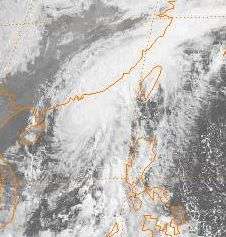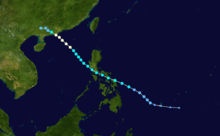Typhoon Brenda (1989)
| Typhoon (JMA scale) | |
|---|---|
| Category 1 (Saffir–Simpson scale) | |
 Typhoon Brenda approaching southern China on May 20 | |
| Formed | May 14, 1989 |
| Dissipated | May 21, 1989 |
| Highest winds |
10-minute sustained: 120 km/h (75 mph) 1-minute sustained: 140 km/h (85 mph) |
| Lowest pressure | 970 hPa (mbar); 28.64 inHg |
| Fatalities | 104 total, 40–53 missing |
| Damage |
$2.86 million (1989 USD) (Philippine total only) |
| Part of the 1989 Pacific typhoon season | |
Typhoon Brenda, known in the Philippines as Tropical Storm Bining, caused significant loss of life in the Philippines and China in May 1989.
Meteorological history

A tropical depression which formed in the monsoon trough on May 14 became a tropical storm on May 16 and was named Brenda. Brenda struck Samar Island, then southern Luzon in the Philippines that day. Due to the cyclone's proximity to the Philippines, the Philippine Atmospheric, Geophysical and Astronomical Services Administration also monitored the storm and assigned it with the local name Bining.[1]
After Brenda struck the Philippines, Brenda became a typhoon and reached a peak of 85 mph (137 km/h) winds. After peaking, Brenda made landfall in southern China in May 20. Brenda weakened to a tropical depression and dissipated on the mext day.
Preparations and impact
Philippines
On May 16, storm warnings were issued for 20 provinces across the Philippines as Brenda approached the country. Multiple commercial vessels were kept at port until the storm passed.[2] At least 50 domestic Philippine Airlines flights were canceled and international flights were diverted to airports not in the path of the typhoon.[3]
Strong winds produced by Brenda caused widespread disruption from the Visayas through Luzon, downing numerous trees and power lines. Significant power disruption occurred in the Bicol Region as well as the Central Visayas. Three people were killed in Manila after a car was thrown into a bus by strong winds.[3] On May 16, during the filming of Delta Force 2: The Colombian Connection, a helicopter crashed roughly 45 km (30 mi) south of Manila, killing five people and injuring four others. The crash was associated with strong winds from Brenda that made flying difficult.[4][5]
Flooding triggered by the storm prompted officials to evacuate over 5,700 people.[6]
Rough seas associated with the typhoon were responsible for several incidents across the Philippines. Two people drowned and thirteen others were reported missing after a motor launch capsized roughly 320 km (200 mi) east of Manila.[3] Off the coast of Calavite Island, 23 people went missing after the cargo vessel MV Zambales sank.[6] In Albay Province, the Corazon-II sank while berthed at the Tobaco town pier.[3] Additionally, the five-ton vessel Albert sank off the southern tip of Luzon with five crewmen. The crew reportedly drifted at sea for three days before tying a makeshift raft to a sea turtle which towed them to safety.[7]
Throughout the Philippines 13–19 people were killed by the storm while another 40–53 were reported missing.[1][6] A total of 652 homes were destroyed while another 4,392 were damaged. Losses from the storm amounted to 73 million pesos (US$2.86 million).[1]
China and Hong Kong
On May 20, 322.8 mm (12.71 in) of rain fell in Hong Kong, marking the second-wettest day in May on record as well as the eighth-wettest day overall.[9]
In the Lam Tsuen Valley, unusually heavy rains produced by the storm triggered 31 landslides.[10]
See also
References
- 1 2 3 "Destructive Typhoons 1970-2003". National Disaster Coordinating Council. November 9, 2004. Archived from the original on November 9, 2004. Retrieved March 12, 2013.
- ↑ "Storm Brenda Intensifies, Nears Central Philippines". Manila, Philippines: Associated Press. May 16, 1989. Retrieved October 21, 2013.
- 1 2 3 4 "South China Sea is raked by storm". Associated Press. Manila, Philippines: Merced Sun-Star. May 18, 1989. p. 38. Retrieved March 12, 2013.
- ↑ "Movie crew didn't realize at first that fatal copter crash was for real". Associated Press. The Deseret News. May 17, 1989. p. 2. Retrieved March 12, 2013.
- ↑ "Deaths on Movie Sets : Some fatal accidents on movie sets". Associated Press. Los Angeles Times. December 20, 1995. Retrieved March 12, 2013.
- 1 2 3 "Tropical storm Brenda rips Philippine coastline". United Press International. Manila, Philippines: Lodi News-Sentenial. May 19, 1989. p. 9. Retrieved March 12, 2013.
- ↑ "Sea turtle reportedly saves storm survivors". Associated Press. Manila, Philippines: Ocala Star-Banner. May 21, 1989. p. 4. Retrieved March 12, 2013.
- ↑ "HKO Warnings and Signals Database". Hong Kong Observatory. August 27, 2012. Retrieved March 12, 2013.
- ↑ Mervyn R. Peart (1991). "Storm period variation of rainfall pH: the example of Typhoon Brenda, May 1989" (PDF). Hong Kong Meteorological Society Bulletin. Hong Kong Meteorological Society; Department of Geography and Geology, University of Hong Kong. 1 (1): 10. Retrieved October 21, 2013.
- ↑ Mervyn R. Peart (July 1992). "Landslides, degradation and erosion in Hong Kong" (PDF). Department of Geography and Geology, University of Hong Kong. International Association of Hydrological Sciences. Retrieved March 13, 2013.
